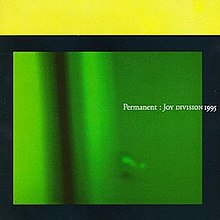Permanent (Joy Division album)
| Permanent | ||||
|---|---|---|---|---|
 |
||||
| Greatest hits album by Joy Division | ||||
| Released | 8 May 1995 | |||
| Genre | Post-punk | |||
| Length | 64:53 | |||
| Label | London | |||
| Producer | Martin Hannett | |||
| Joy Division compilations chronology | ||||
|
||||
| Professional ratings | |
|---|---|
| Review scores | |
| Source | Rating |
| AllMusic | |
| Encyclopedia of Popular Music | |
| Entertainment Weekly | A– |
Permanent is a compilation album by English post-punk band Joy Division. It was released in the United Kingdom on 8 May 1995 by London Records and in the United States on 15 August 1995 by Qwest Records and Warner Bros. Records. The album charted for three weeks and peaked at number 16 on the UK Albums Chart.
Permanent contains tracks from the band's two studio albums, Unknown Pleasures and Closer, as well as other tracks previously released on the compilations Substance and Still.
The album contains one new track and one track that was previously unavailable on an LP. The new track was a new mix of "Love Will Tear Us Apart" titled "Permanent mix". This version of the song features guitar throughout the song, balancing the synths and bass giving a fuller sound. The track that was previously unavailable on an LP was the "Pennine version" of "Love Will Tear Us Apart", which was originally released as one of the B-sides on the "Love Will Tear Us Apart" single and was used here in place of the regular version. The "Pennine version" label had not yet come into use at the time of the album's release (it would not do so until the release of the expanded edition of Substance in 2015) and was not listed here as being an alternate version at all. The liner notes (first on a Joy Division album) were provided by Jon Savage.
Entertainment Weekly critic Josef Woodard deemed Permanent a "still-vital compilation" that showcases Joy Division's "cool, beyond-punk voltage beneath Curtis' murmurings."Robert Christgau from The Village Voice said although others revered Ian Curtis' despair, he himself preferred how the band was showcased on the compilation, finding it complementary to 1995's The Best of New Order.Stephen Thomas Erlewine was less enthusiastic in his review for AllMusic, believing it was less useful than the 1988 compilation Substance and the studio albums it compiles tracks from, even though there is "a wealth of brilliant music".
...
Wikipedia
